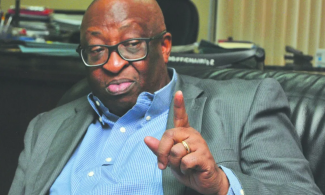
The economist also said the federal government should secure more infrastructure tied loans, like the Sukuk bond that is purposed for raising money to fix road networks.
An ex-director at the Central Bank of Nigeria (CBN), Prof. Akpan Ekpo, says getting banks to reduce their lending rate to at list 14 per cent, is stronger than any stimulus package rolled out by the monetary regulator.
Ekpo said the reduction of the inter-bank interest rate from 13.5 per cent to 12.5 per cent by the Monetary Policy Committee, does not affect the cost of borrowing for everyday Nigerians.
The CBN governor, Godwin Emefiele, told journalists while reading the MPC communique at the end of its May meeting that the bank’s stimulus packages would help the economy stave-off recession if well implemented.

Ekpo, a former Vice-Chancellor of the University of Uyo, said the decision taken by the committee does not have any impact on accessing loans for every day Nigerians.
“The MPR should have an impact on the lending rate but in Nigeria, it doesn’t,” he said. “It only has an impact on the inter-bank rate. In Nigeria, the lending rate is about 27 per cent on average. The CBN, being the apex bank, can force the banks to reduce the cost of funds to borrowers… at least 14 per cent for a start, no bank will close down.”
Before the May meeting of the MPC, which is made up of the monetary regulator’s top management, the CBN designed a loan package worth N1.15tn at five per cent interest.
It targeted N1tn at the agriculture and manufacturing sectors; N100bn was directed at the health care industry and N50bn for households as well as small businesses who can show proof that they have been affected by COVID-19.
The bank also reduced the interest payment on all its pre-COVID loans from 9 to 5 per cent. Ekpo believes if all these are not backed up by job-yielding investments in power and transportation, the optimism of the MPC may be lost.
“The CBN rollout alone cannot take us out of recession. The CBN rollout plus massive government infrastructure… hard and soft infrastructure, that is what will get us out of recession,” he said.
The economist also said the federal government should secure more infrastructure tied loans, like the Sukuk bond that is purposed for raising money to fix road networks.
This, he advised, should go in line with shedding the cost of governance.
Since the global oil price slump that started in 2014 and halted by OPEC and its Russian alliance through output cuts in 2017, the Nigerian economy has been one of the slow burners in the continent.
In 2019, the largest economy in Africa rose by 2.27 per cent, its best performance since the 2016 recession. Inversely, the Ghanaian economy grew by 6.5 per cent, Kenya’s accelerated by 5.4 per cent, while Rwanda’s leapt by 9.5 per cent.
In 2020, Nigeria’s GDP was expected to strengthen by 2.1 per cent according to the World Bank and 2.5 per cent according to the IMF.
Contrary to the positive stance of Nigeria’s monetary team that the country can escape recession, IMF anticipates a 3.4 per cent shrink; which it said would lead to a recession that will stretch into 2021.
The Ghanaian government said it was expecting a 4.2 per cent reduction in economic growth, from this year’s assumption of 6.8 per cent, while Rwandan President, Paul Kagame, said his country would shed six per cent in GDP value.
The estimated economic loss due to COVID-19 for both countries weighs above the value of the Nigerian economy’s projected 2020 growth pre-COVID-19.